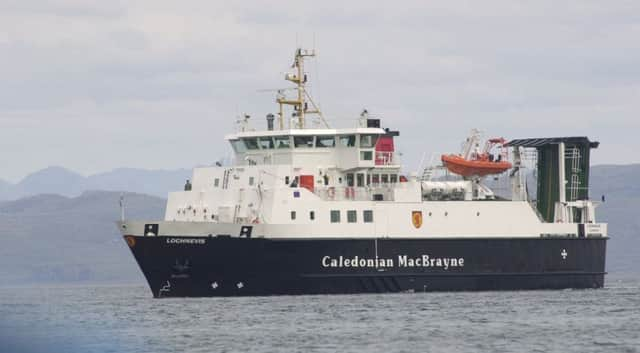CalMac ferry strike ‘could harm tourism’


Transport minister Derek Mackay told MSPs yesterday that “live discussions” were under way and “the potential for agreement is very, very close”.
His comments came after infrastructure secretary Keith Brown spoke to officials of the Rail, Maritime and Transport union (RMT), with a meeting in London planned for next week.
Advertisement
Hide AdAdvertisement
Hide AdCalMac said today it would operate ten of its 27 routes if the strike went ahead, but no ferries would run on the main routes to Arran, Colonsay, Islay, Mull, Coll, Tiree, the Small Isles and the Western Isles.
Several other routes would also be affected, with a limited, passenger-only service to Bute – one of its busiest.
CalMac, a Scottish Government-owned firm, said passengers “should consider carefully whether their trip is essential”.
It has already been forced to cancel one in ten sailings yesterday and today because of an overtime ban by the RMT.
The dispute is over fears for jobs, conditions and pensions if CalMac’s private-sector rival bidder Serco wins the next eight-year contract from 2016.
Mr Mackay announced yesterday an “independent procurement reference panel” to ensure the contract tender process was “fair, open and transparent”.
Scottish Tourism Alliance chief executive Marc Crothall said: “We would expect to see a significant loss of revenue to the many tourism businesses that contribute to the Highland and Islands’ wider visitor economy as a result of the proposed strike.
“It’s not just holidaymakers that are heading to the islands this week. There are many weddings and events scheduled to take place across all of the destinations over the coming days that will now be impacted by the strike.”
Advertisement
Hide AdAdvertisement
Hide AdRobert Kidd, chair of the Scottish Destination Management Association, which represent tour operators, said: “The timing, at the very peak period of the key summer season, is already having a severely disruptive and detrimental effect on thousands of visitors, many of whom have travelled a long distance.
“In the long term, the reputation of Scotland as a tourism destination and Scotland’s economy – particularly tourism businesses – will be significantly damaged by an ongoing dispute.”
The RMT has demanded a written guarantee, of no compulsory redundancies and protection of pay and conditions, be added to its collective agreement with CalMac.
General secretary Mick Cash said: “Our members have been forced to take action due to the failure of the company to respond, despite ample warning, to the union’s calls for assurances that would protect both the livelihoods of the loyal and hard-working CalMac staff and the essential ferry services that they provide.
“The last thing they would want is to inconvenience their own friends and neighbours but when you have had your arm twisted up your back, and you know exactly what is looming on the horizon, there comes a point when you either make a stand or you roll over.”
CalMac managing director Martin Dorchester said: “We have made several serious concessions to the RMT, including a commitment on no compulsory redundancies in our bid submission in return for the RMT calling off the industrial action planned for this week.
“Unfortunately this was rejected.
“We were also willing to work together with both the RMT and TSSA union over the coming days to agree a form of words in our collective agreements which would provide greater protection to employees around terms and conditions of employment, but without success.”